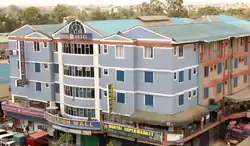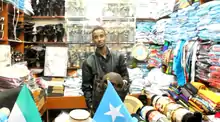Eastleigh, Nairobi
Eastleigh is a neighbourhood in Nairobi, Kenya. It is located east of the central business district. It is known for its business prowess,[1] as well as "its poor infrastructure.[2]
Eastleigh | |
|---|---|
Suburb | |
 The Kenyan owned Eastleigh Mall, Andalus Hotel and Horyal Supermarket in central Eastleigh. | |
| Nickname(s): Easich | |
 Eastleigh Location of Eastleigh. | |
| Coordinates: 1°16′00″S 36°51′00″E | |
| Country | |
| District | Nairobi |
| Time zone | UTC+3 (EAT) |
History
Eastleigh was founded in 1921. At this time, it was formally called Nairobi East Township and was mostly populated by Somalis who had moved from the Ngara Plains. While the colonial government originally tried to segregate citizens by race and ethnicity, failures at doing so in the Eastleigh neighbourhood more or less stopped the practice under colonial rule, so class became the general segregating factor afterwards.[3] The colonial government allotted Nairobi's residential estates by race, and Eastleigh was pointed for Asians and elite Africans who worked as clerks, builders or shoemakers.[4] Eastleigh was originally a large Kenyan Asian enclave until independence in 1963. In recent years, the suburb has been dominated and almost exclusively inhabited by Somali immigrants.[2]
Military
The Eastleigh Airport (Moi Air Base) is located in the northern parts of Eastleigh. The base was the site of the British Royal Air Force base known as RAF Eastleigh. The dual-use facility was also the main civilian international airport in Nairobi for the period 1943-1958 before the opening of the new airport at Embakasi (since named Jomo Kenyatta International Airport).[5]
Since 2012, the neighbourhood and various areas across Kenya have experienced a number of terrorist attacks linked to the Al-Shabaab militant group, which were launched in retaliation for the Kenyan military's deployment of troops in southern Somalia against the insurgents.[6]
Administrative divisions
Administratively, Eastleigh is divided into Eastleigh North and Eastleigh South. Both are part of Nairobi's Pumwani division.
Eastleigh is further partitioned into three areas:
- Section I - from Juja Road
- Section II - the commercial center
- Section III - situated towards Jogoo Road
Economy

Eastleigh is almost entirely inhabited by Somalis, except for a few indigenous residents.[2] The suburb's commercial sector is likewise dominated by Somalis, with most if not all businesses owned by the Somali community.[2] Somalis have invested heavily in the enclave.
Businesses in the suburb range from small stalls to shopping malls and night lodges, and all feature Somali names such as Tawakal, Mogadishu, Qaran and Halal. Products are typically imported from Mogadishu and Dubai, and include designer clothing, jewelry and even camel milk. Starting in late 2012, a mass exodus of Somali residents was reported after a prolonged period of harassment by the Kenyan police and public. Hundreds of Somali entrepreneurs withdrew between Sh10 to Sh40 billion from their bank accounts, with the intention of reinvesting most of that money back home in Somalia. The collective departures most affected Eastleigh's real estate sector, as landlords struggled to find Kenyans able to afford the high rates of the apartments and shops vacated by the Somalis.[7]
Schools
There are a lot of schools located in Eastleigh, they include;
- Eastleigh High School
- St Teresa Boys High School
- St Teresa Girls High School
- Pumwani Boys High School
- Maina Wajingi High school
Notable residents

- Hussein Mohamed, Vice Chairman of the Eastleigh Business Association.
- Mohamed Amin, a famous photojournalist born in Eastleigh.
Notes
- "Nairobi County". NiElect. Archived from the original on 2 October 2013. Retrieved 30 September 2013.
- Kenya/Somalia: Somalia community doing booming business in country Archived 2011-02-16 at the Wayback Machine - Norwegian Council for Africa
- Murunga, Godwin Rapando (1 August 2012). "The cosmopolitan tradition and fissures in segregationist town planning in Nairobi, 1915–23". Journal of Eastern African Studies. 6 (3): 463–486. doi:10.1080/17531055.2012.696896. ISSN 1753-1055.
- Daily Nation, December 27, 2008: Roads are a mess, but memories of good times linger
- Pirie, Gordon: "Nairobi's airports -- windows on Kenya's colonial past and top-down planning".
- "Deadly blast 'shreds' bus in Kenyan capital". 14 December 2013. Retrieved 16 December 2013.
- Mohammed, Guled (9 January 2013). "Kenya: The Cost of Harassing Somalis Over Terror". The Star. Retrieved 13 January 2013.
References
External links
- Eastleigh, Nairobi - The Facts
- The Standard, February 11, 2007: Eastleigh: A fast growing city within a city
